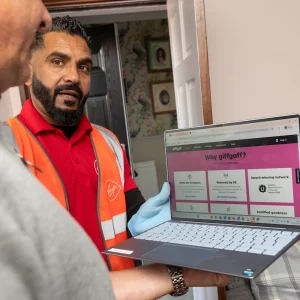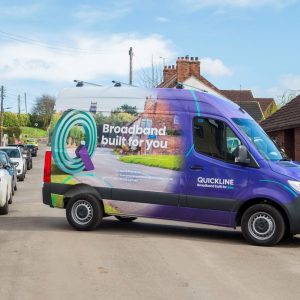Sponsored Links
Blewbury in Oxfordshire Now Leads BTs UK Race for Superfast Broadband
Posted: 06th Dec, 2010 By: MarkJ
 UK ISP BT Retail has today issued an update for its nationwide Race to Infinity survey, which seeks to gauge how much demand exists for its new "super-fast" ( FTTC / FTTP ) broadband services. The top five telephone exchange areas with the largest percentage of votes (must have more than 1,000) by 31st December 2010 will benefit from a super-fast service upgrade by 2012.
UK ISP BT Retail has today issued an update for its nationwide Race to Infinity survey, which seeks to gauge how much demand exists for its new "super-fast" ( FTTC / FTTP ) broadband services. The top five telephone exchange areas with the largest percentage of votes (must have more than 1,000) by 31st December 2010 will benefit from a super-fast service upgrade by 2012.To date BT has received more than 290,000 votes from communities across the UK. The ISP is also pledging to engage with any area not winning the competition where at least 75% of homes and businesses have voted (minimum of 1,000 votes) for super-fast broadband.
BT's Race to Infinity Top 10It's worth pointing out that five other communities have also managed to secure more than 1,000 votes. Sadly their percentages are, in most cases, significantly lower. For example, Malvern (Worcestershire) has almost 1,500 votes but that represents just 9.5% of the local market.
1. Blewbury, Oxfordshire
(Votes: 1012 / Percentage of Connections: 82%)
2. Caxton, Cambridgeshire
(Vote: 1599 / Percentage of Connections: 79%)
3. Castleton, Newport
(Votes: 1075 / Percentage of Connections: 68%)
4. Madingley, Cambridgeshire
(Votes: 1285 / Percentage of Connections: 60%)
5. Whitchurch, Hampshire
(Votes: 1383 / Percentage of Connections: 56%)
John Petter, Managing Director of BT’s Consumer division, said:
"Thousands have voted, but there is still a long way to go before we reach the finishing line and everything to play for. Superfast speeds can transform your online life whether you’re social networking, gaming, streaming video, uploading or downloading. So please vote now and don't forget to spread the word by passing it on to your friends on Facebook and Twitter to get your area to the top of the scoreboard."
"Thousands have voted, but there is still a long way to go before we reach the finishing line and everything to play for. Superfast speeds can transform your online life whether you’re social networking, gaming, streaming video, uploading or downloading. So please vote now and don't forget to spread the word by passing it on to your friends on Facebook and Twitter to get your area to the top of the scoreboard."
We still feel that BT has not allowed enough time for its survey to be completely successful, while others have pointed to flaws in their system. Some survey respondents have apparently been able to vote for multiple addresses in their area, often without the address owner's permission.
Elsewhere the threshold of 1,000 has been criticised by some for being set far too high and excluding rural areas. In effect BT appears to be targeting areas that their own natural (privately funded) expansion would probably have reached anyway, albeit doing so far sooner than anticipated. It's still a good way to drum up publicity.
Search ISP News
Search ISP Listings
Search ISP Reviews
Latest UK ISP News







Cheap BIG ISPs for 100Mbps+
150,000+ Customers | View More ISPs
Cheapest ISPs for 100Mbps+
Modest Availability | View More ISPs
Latest UK ISP News
Helpful ISP Guides and Tips
Sponsored Links
The Top 15 Category Tags
- FTTP (6915)
- BT (3917)
- Politics (3119)
- Business (2821)
- Openreach (2702)
- Building Digital UK (2537)
- Mobile Broadband (2526)
- Statistics (2161)
- FTTC (2152)
- 4G (2131)
- Virgin Media (2064)
- Ofcom Regulation (1801)
- 5G (1781)
- Fibre Optic (1616)
- Wireless Internet (1615)
Sponsored
Copyright © 1999 to Present - ISPreview.co.uk - All Rights Reserved - Terms , Privacy and Cookie Policy , Links , Website Rules





























